Paul Kent: Tough reality behind the blood, sweat and tears for NRL players and coaches
The toughness of NRL players is an accepted fact but the death of Paul Green was a jolting reminder of how taxing the game is, writes Paul Kent.
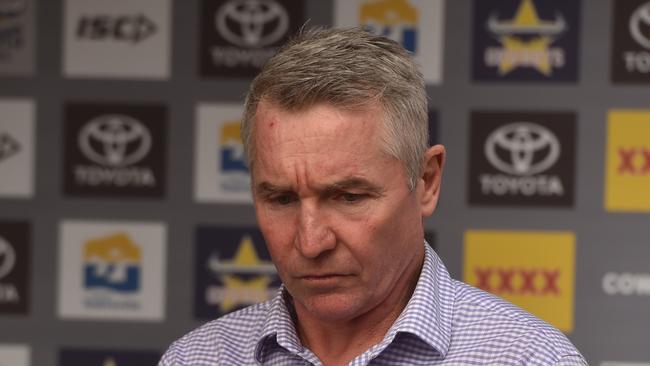
Opinion
Don't miss out on the headlines from Opinion. Followed categories will be added to My News.
The way it looked, a mobile M*A*S*H unit had rolled into town, thrown open the doors to triage and set about mopping up all the blood they could find.
Blood was coming from somewhere on Joseph Suaalii’s face. All the television replays suggested the mouth or nose, but it could have been anywhere given what was happening around him.
The Roosters were putting their heads in places most wouldn’t put their feet.
Nat Butcher was split across the eye and both his wrists were buggered, according to the official diagnosis.
Jared Waerea-Hargreaves’ blood was staining his beard. Sam Verrils sported a bloodied lip that looked like a rogue boa constrictor had swallowed a pig while somewhere off in the background doctors in gumboots were stitching together Victor Radley’s left eye.
Stream every game of every round of the 2022 NRL Telstra Premiership Season Live & Ad-Break Free During Play on Kayo. New to Kayo? Start your free trial now >
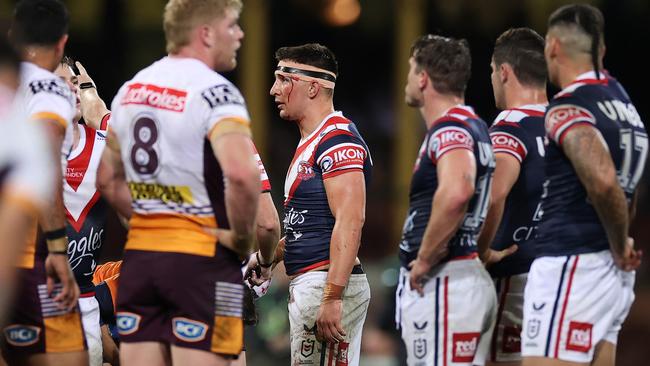
Few had seen blood pour from an eye like they had when Radley was split on the field, like a brewery tap left on, and after quick surgery to get him back on the field he now needed the wound closed more securely.
Elsewhere, Drew Hutchison had icebags on both knees. Angus Crichton was nursing an elbow that might never be fully right before the season is over and around that various bumps and bruises were all over the rest.
This was the Roosters’ dressing room after last round’s win over Brisbane and yet, in among the uncommon scenes and all this dressing room activity, what was truly remarkable was not all the blood and contusions, but what was not happening.
Not a minute of fuss was being made about the Roosters and their injuries or what they had just put their bodies through to beat the Broncos.
The dressing room was … normal.
It was an insight into the Roosters and what they face the rest of this season as they chase the play-offs and what would be a historic premiership and, smaller than that, what they face on Saturday night against second-placed North Queensland, and what sits somewhere deep in their conscious about what it means to be a Rooster and to represent the Roosters in a way that makes them all proud, even the old Roosters, and so somewhere in there they will come to what Paul Green means to them.
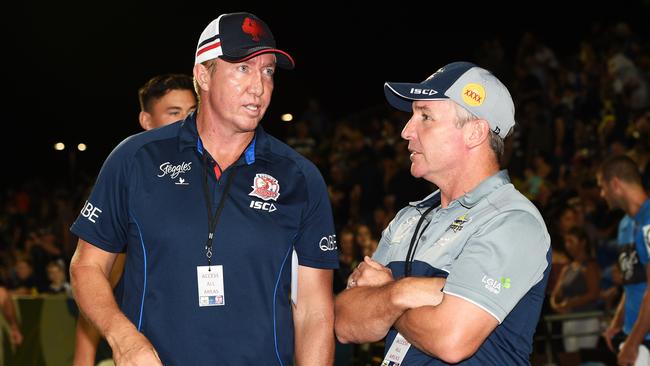
Green played and also coached at the Roosters and his death on Thursday cut deeply at the club, where much of his coaching apprenticeship was done. They feel the bond.
And we all know how he unforgettably led North Queensland to its only premiership seven years ago, so little else needs to be said about that.
The toughness of NRL players is an accepted fact but the game stumbled on Thursday, in a way that is becoming increasingly numbing, Thursday becoming the reminder of what the game demands and what the game takes.
With no clear way forward yet the two clubs will come together on Saturday night, emotionally raw, and look to shake the earth in the name of Green.
The Cowboys put their credentials in place over a summer where coach Todd Payten took his team out of their place of comfort and put a little steel back in them that hadn’t been there since Green drove them to their only premiership.
He made training a misery all summer. The players did not know what to expect, the training sessions started at odd times and with surprising drills, and hard long fitness sessions, and a clear intent from the coach that these Cowboys were going to be known for something more than being a popular away trip. The Mad Cow Tavern has never been so sombre.
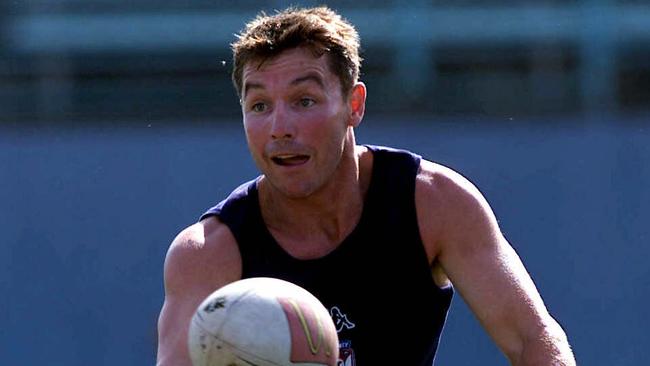
Payten’s approach was similar to these Roosters.
Simply, the wounds of their dressing room last week were their badge of honour, the entry fee for what it meant to be a Rooster. Nobody spoke about it. Nobody treated the bleeding men any differently than anybody else in the room.
It was entirely deliberate.
Wellness tests were once popular around the NRL, at some clubs more than others. It was an effort to show professionalism at the club, part of the journey they were all on.
The players know what’s required, went the rhetoric, and they knew what they needed to do to get themselves right.
In the end, all it was was another one of those misguided ideas the game finds itself in at times like wearing torpedo pants to prevent corked thighs or running 400s after a big loss.
The way it worked players were asked how they felt physically on a scale of one to five.
A five meant they were fatigued, sore, rundown, and probably needed a day or two off from training to freshen up, perhaps even a good massage.
A score of one was them saying they were as fresh as farm eggs and ready to go.
It was terribly flawed.
At the poorer clubs, too often a majority of players would get some point through the season and get the opportunity for a day off from training, or just a light session, and tell the trainer walking around with the report card that they felt a solid five or three.
The Roosters are different.
Not so long ago Roosters coach Trent Robinson was sitting with Stuart O’Grady, the former cyclist, talking about training and what it took to win and, also, what could not be tolerated.
The conversation got onto mental toughness, which means part of the conversation got onto the weakness. It was an area O’Grady is familiar with.
Pound for pound cyclists are as tough as any citizen you care to compare. Few have the constitution to push themselves to the limits cyclists regularly endure, for as long as they do.
Strength and weakness are like the good wolf and the bad wolf waiting outside our all doors. The one that wins is the one you feed.
So after the Broncos game last week Robinson looked around his busted dressing room at all these men, warriors in their own way, and knew his players needed a break to freshen.
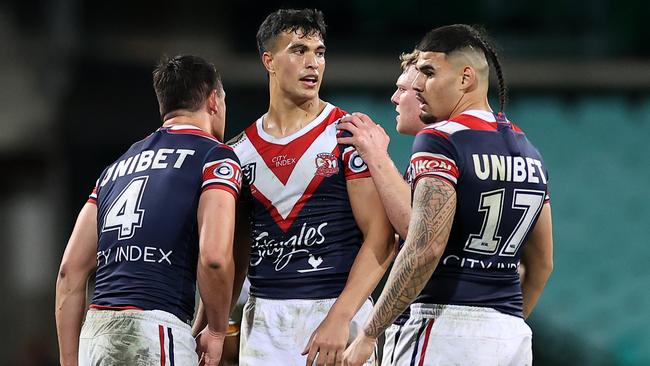
The sin would have been to ask them. An acknowledgment they needed a rest would feed the weakness. On the flipside, if he asked them to turn up to training the next day they would have been there, still healing, ready to go as much as they needed a break.
When Waerea-Hargreaves is asked how he is feeling, for instance, all Robinson gets in response is a grunt. He refuses to be weak. Radley never cares how busted his body is, he just puts his head up and smiles and says he is also right to go.
The way to preserve their integrity was to make the decision for them, and so Robinson told them to take a few days off before they came back ready to prepare for the Cowboys.
And then it changed on Thursday, when everybody took a step back and had their own private moment, the game and its realities suddenly getting very real.
And so, on Saturday night, two clubs closely linked to a man who made a difference to many will head out and, with nothing to give but all they have, and all he helped them stand for, they will honour him in their own way.
SHORT SHOT
The first thing I’ve got to say is I work on the all big fights for Main Event.
Next month, Paul Gallen will step into the ring for the third-last and then second-last time when he fights two men on the same night, former NRL rivals Justin Hodges and Ben Hannant.
The promoters are still trying to figure out how the format works, how many rounds it might be or how long those rounds will be.
Both Hodges and Hannant want to be first in the ring, believing any victory will be reduced if they are the second fighter in the ring against a fatigued Gallen.
Nobody has yet made any concession to the inherent dangers of putting in a fresh fighter against a man who has already done several rounds.
The great criticism should be reserved for the yokels running Queensland boxing, and how they could sanction it, and their total lack of moral accountability for what they have allowed.
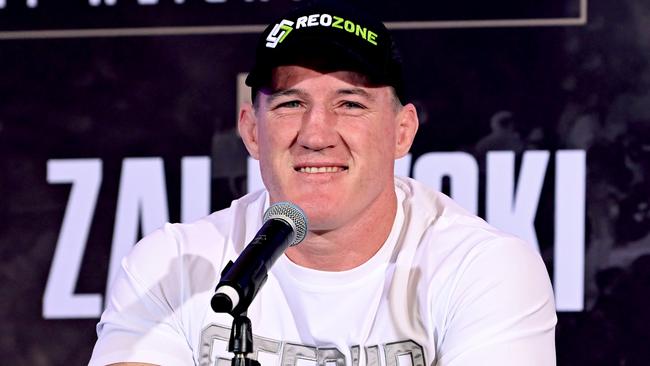
George Foreman once fought five men in a night. The idea was for Foreman to fight five men, knock them all out, and regain his mental edge after Muhammad Ali dethroned him a year earlier.
Five fights was dangerous, though, and authorities knocked it back, so the card was changed from fights to “exhibitions” to get it licensed.
It was regarded as one of the saddest nights in the sport’s history. Ringside, commentator Howard Cosell said: “The thing is a carnival and it’s not pleasant to see.”
The same goes with Gallen fighting these two next month.
Gallen will need no more than three rounds to get through both Hodges and Hannant. If he has a cab waiting it will be even shorter.
The carnival has come to our town.
People often ask me why I like boxing, particularly recently as boxing seems to be at odds with my stance on concussions in the NRL.
There is a nobility in the sport, though, which goes to a man risking everything he has, while giving everything he has, for a chance at a better life.
But this is potentially dangerous, lacks dignity and credibility, and I won’t be working on this one.
What the NRL must do to help coaches
-Brent Read
ARL Commission chair Peter V’landys has had plenty on his plate in recent weeks trading barbs with the NSW premier over the suburban stadium fiasco.
His most important missive, however, may have been delivered on Friday morning during a regular stint on the Ben Fordham Show on Sydney radio station 2GB.
It had nothing to do with the government or stadiums. It didn’t concern where South Sydney would play next year or whether Leichhardt Oval would get some money for a makeover.
Where V’landys has used his regular spot in recent weeks to pile pressure on the NSW government over their commitment to invest millions in suburban grounds, on Friday he used it to deliver an emotional message to not just rugby league, but the wider community, on the importance of looking after each other and speaking out.
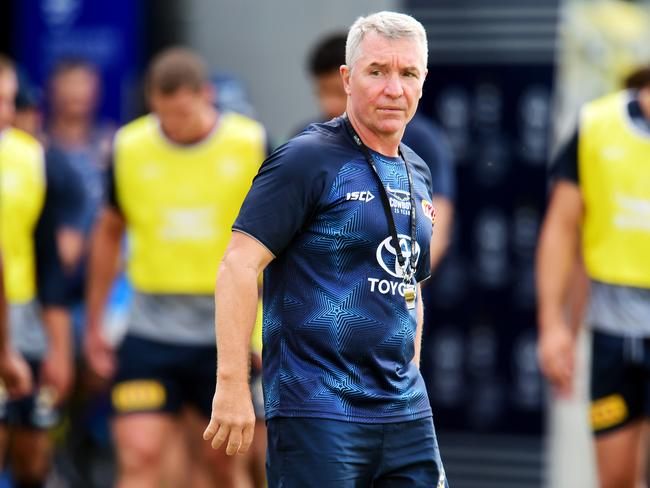
Paul Green’s passing has rocked rugby league. The circumstances surrounding the premiership-winning coach’s death have devastated the code.
Green was 49 and seemingly had everything to live for. He had a young family, was surrounded by mates and an opportunity to return to the coaching game. Only days ago, he was at the Cronulla Old Boy’s day and looked in fine fettle.
Now he is gone and rugby league is taking a moment for introspection. A premiership-winning coach has departed in tragic circumstances and as V’landys noted, it shows how fragile life can be.
Coaching is a high-pressure game. When you are in the maelstrom, it occupies your every thought and action. Some coaches spend years living life on the brink. Even the most successful reach an end point.
They bemoan the attention on their futures when they are in the game but crave a return to the big stage in their absence, wanting for nothing more than to be back in the spotlight. They invariably get linked with every vacancy that comes up, which in turn drags over the embers of their previous position and how it ended.
Green was unfairly tarnished in his coaching absence by the way things ended at North Queensland. The talk was that he was too intense and overbearing on the playing group.
It was the same accusation that was thrown at Michael Maguire in his final days at the Wests Tigers. It was and is unfair on both men.
You don’t coach for a decade and win premierships if you don’t know how to manage a playing group and massage egos. You don’t enjoy the sort of success both men have if you don’t know how to navigate a dressing room.
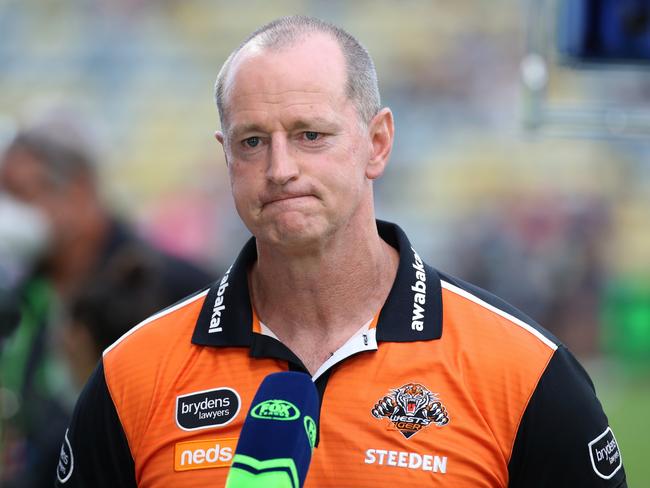
Green, like Maguire, was among the best at it. Now it is Manly catch Des Hasler under scrutiny and we all need to tread carefully. In hindsight, the story this columnist wrote about Hasler being under pressure on Thursday was poorly timed and if I had my time over again, I would have tempered or written it in a more respectful manner in light of events in recent days. To Des, I apologise.
Green left an amazing legacy in North Queensland and in the code itself but perhaps an even greater legacy will be the awareness his passing helps create.
The time has come to give more help to the coaches association, a fledgling organisation that was created to help coaches not just in the NRL, but across the game.
Funding to the association wasn’t helped by Covid but the NRL has supported the work that Mal Meninga and Brian Canavan are doing to energise the body.
The past few days have demonstrated that coaches need as much support as anyone.
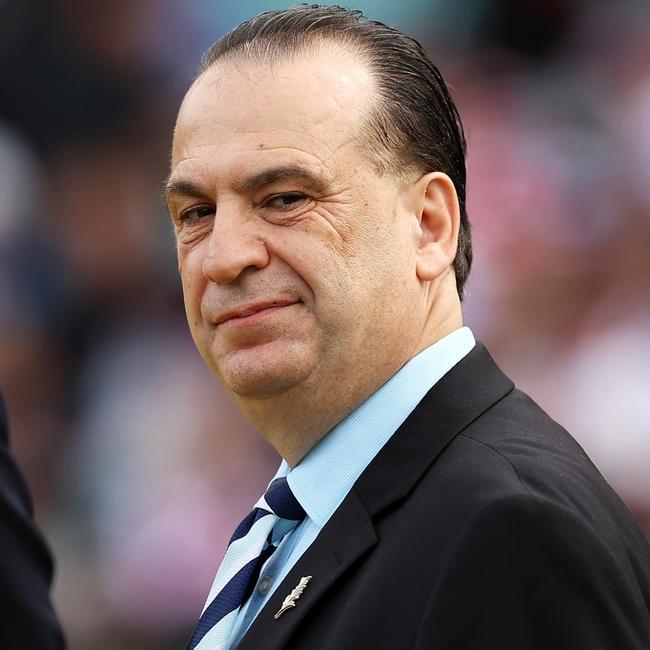
Certainly, few in rugby league are under as much pressure, not just when they are in the hotseat but after they have moved on.
In the meantime, V’landys hit the nail on the head. Speak out. Lean on your friends. Speak up if you are feeling down. Don’t be ashamed and don’t be afraid.
“You have to reach out to people,” V’landys said.
”You’re human and you doubt yourself. We all go through that. I talk about it to people. I am not embarrassed to talk to people when you are feeling down.
“You have to - you have to let those emotions out. It can happen to anyone. Don’t be proud because you have people who love you and you should reach out.”
Well said.
* * * * *
Cameron Smith was asked about his potential defection to the LV Tour again on Friday morning and the obsession in the sport over the controversy it would cause.
His response? “I’m ready to cop some heat,” Smith said. “I understand that is what was said but like I said, I am here to win the FedEX Cup, that is my No.1 goal.”
Smith is playing his cards close to his chest but put yourself in his shoes for a moment. Smith has reportedly been offered more than $US100 million to join Greg Norman’s Saudi-backed rebel league.
It is life-changing money. Sure, Smith earns a good wage now on the PGA Tour. But the sort of figures that are being bandied about are almost too irresistible. How many of us would say no?
I am tipping most of us would reach for a pen and ask where to sign. So let’s not hang Smith out to dry if he does make the switch.
Let’s acknowledge that we would all do the same thing in his situation. Let’s wrap our arms around him when he comes home later this year and salute his win at the Open Championship.
Smith is one of our greatest sportsman. By the end of the year, he might be the No.1 player in the world. Let’s give him the credit he deserves.
More Coverage
Originally published as Paul Kent: Tough reality behind the blood, sweat and tears for NRL players and coaches





